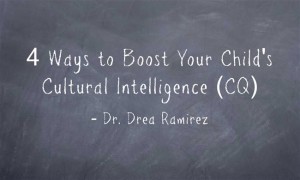The world is changing at a rapid pace because of increasing access to information and the ability to communicate on a global platform. It is our job to prepare our children to be globally-minded and ready to fill those jobs that will require a new kind of cross-cultural skill called Cultural Intelligence (CQ). So, what is cultural intelligence and how can you teach it to your children?
Cultural intelligence is the ability to work effectively across cultures. It has four major parts which include 1) knowing (cognitive CQ), 2) understanding (metacognitive CQ), 3) motivation to learn (motivational CQ), and 4) the ability to adjust (behavioral CQ) to cultural norms. Here are four ways you can boost your child’s cultural intelligence:
1) Learn about cultural norms. There are anywhere from 8 to 13 reported cultural dimensions (or cultural norms). Cultural norms are the rules that govern the behavior in a specific culture. So cultural norms refer to how people communicate, establish trust, express disapproval, expect to be treated, value and organize relationships, and view success/failure. One way to learn about cultural norms is to read up on indirect vs. direct communication, individualism vs. collectivism, masculine vs. feminine cultures, and saving face. Teaching kids about customs of different countries is great, but you can take it up a notch in preparing them to be excellent cross-cultural communicators by teaching them about cultural norms.
2) Boost your own cultural intelligence. The more you know, the more you can share. Navigating through new cultures often requires a guide. You can become that guide for your child to be able to identify, understand, be motivated to learn, and adjust to cultural norms. Practical ways to do this is by learning a new language and by having exposure to other cultures. A great way to do this is to learn a new language for a year to two and then visit a country that speaks that language. Exposure to new ways of living helps to build empathy for others that are living in our culture and away from their own. In order to build cross-cultural relationships, your children surely will need to have a strong ability to empathize.
3) Be intentional about making friends that are not culturally like you. Friendship breaks down all sorts of barriers. You are more likely to ask a friend than a stranger about sensitive questions related to cultural differences. You need a safe place to ask questions to really understand cultural norms. Several people “know” (cognitive cultural intelligence-CCQ) about cultural norms but never get to a point of understanding (metacognitive cultural intelligence-MCCQ).
4) Prepare kids for confusion acceptance. Our kids pick up on our attitude probably better than most people we encounter. Motivational cultural intelligence is the desire/motivation to learn about cultural norms. There is a certain flexibility involved in motivational cultural intelligence most often referred to as confusion acceptance (accepting that there will be a certain amount of time where you are confused about the new cultural practices, expectations, and norms). Teach your kids that it is perfectly normal to not understand every part of another person’s culture but that you can allow yourself time to learn how a person thinks and sees the world. The more flexible and at ease you are with this time of confusion, the more likely your kids will take on that same attitude toward new cultures.
If your children have cultural intelligence, they will be ahead of the curve when it comes to cross-cultural interactions! You have a unique opportunity to strategically prepare them for global business opportunities. My hope is that you use this information to do just that!
References:
Brislin, R., Worthley, R., & MacNab, B. (2006). Cultural intelligence: Understanding behaviors that serve people’s goals. Group & Organization Management, 31(1), 40-55.
Earley, P. C., & Ang, S. (2003). Cultural intelligence: Individual interactions across cultures. Palo Alto, CA: Stanford University Press.
Earley, P. C., & Mosakowski, E. (2004). Cultural intelligence. Harvard Business Review, 82(10), 139-146.
Earley, P. C., & Peterson, R. (2004). The elusive cultural chameleon: Cultural intelligence as a new approach to intercultural training for the global manager. Academy of Management Learning and Education, 3(1), 100-115.
Hofstede, G. (2001). Culture’s consequences: Comparing values, behaviors, institutions, and organizations across nations. Thousand Oaks, CA: Sage.
Ramirez, A. R. R. (2010). Impact of cultural intelligence level on conflict resolution ability: A conceptual model and research proposal. Emerging Leadership Journeys, 3(1), 42-56.
Share with friends! You can tweet, pin, like, or share below.
